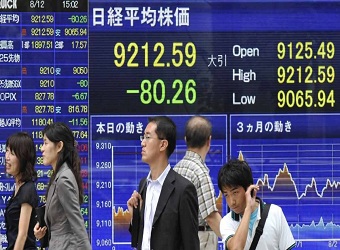Asian markets traded sideways on Friday, following a flat to lower close on Wall Street, in a light regional data day.
Japanese benchmark Nikkei 225 fell 0.35 percent on Friday morning.
Australia’s ASX 200 closed up 0.24 percent or 13.8 points at 5,799.6.
In South Korea, the Kospi added 0.67 percent or 14.5 points at 2,164.58 as the won weakened against the dollar.
U.S. Secretary of State Rex Tillerson heads to Seoul today, as part of his visit to Asia. Tillerson said on Thursday in Japan that part of his visit was to find a “new approach” to deal with threats from North Korea.
China’s Shanghai composite fell 0.97 percent or 31.6 points to close at 3,237.31 and the Shenzhen composite slipped 0.81 percent or 16.6 points at 2,029.73. Hong Kong’s Hang Seng was flat by 3:05 pm HK/SIN.
Cathay Pacific, Hong Kong’s flag carrier, was up 1.26 percent after the company confirmed a Reuters report that it would target deep management cost cuts at its headquarters by 30 percent.
The airline reported its first full-year net loss last year since 2008.
China pledged a firm response if Japan were to interfere in the South China Sea, after Reuters reported on a Japanese plan to send its largest warship, the Izumo helicopter carrier, to the disputed waters.
The carrier is expected to make stops in Singapore, Indonesia, the Philippines and Sri Lanka before joining the Malabar joint naval exercise with Indian and U.S. naval vessels in the Indian Ocean in July, Reuters reported. This would be Japan’s biggest show of naval force in the region since World War Two.
Over in Southeast Asia,Singapore’s posted its strongest non-oil domestic exports (NODX) in February, up 21.5 percent on-year. The February export figures beat a Reuters poll of an expected 12.8 percent gain from the previous year.
Major U.S. indexes closed mostly lower, weighed by losses in the healthcare sector after U.S. President Donald Trump released his budget blueprint that proposed cutting spending for the National Institutes of Health by $5.8 billion.
The Dow Jones industrial average closed down 0.07 percent at 20,934.55, the S&P 500 closed lower by 0.16 percent to 2,381.38 and the Nasdaq composite closed nearly flat at 5,900.76.
Chinese group, the Global CEO Fortune Club, launched its first overseas fund on Thursday with an aim to invest in Australian infrastructure projects. The group expects to find opportunities for public-private partnership from its base in Melbourne.
On Wednesday, the Federal Reserve had raised interest rates and the People’s Bank of China followed and lifted its short-term interest rates on Thursday.
One of Australia’s “Big Four” banks, National Australia Bank, said it would raise rates on variable home loans for owner occupiers and investment properties.
“The story in global markets over the past 24 hours has centered on a broad-based tightening of monetary policy conditions- and the perception of future tightening- while the cost to borrow from certain financial institutions has also increased,” said Chris Weston, chief market strategist at spread-better IG, in a Friday note.
In China, Saudi Arabia’s King Salman oversaw the signing of deals worth as much as $65 million on the first day of a visit to Beijing.
Some of the deals included a memorandum of understanding (MoU) between Saudi Aramco and China North Industrial Group to look into building more plants in China.
The dollar remained under pressure against a basket of currencies, at 100.17 compared to levels above 101 seen earlier this week. The yen traded at 113.31 against the greenback early Asian morning and the Australian dollar fetched $0.7685.
During Asian hours on Friday, Brent crude slipped 0.14 percent to $51.67 a barrel, and U.S. light crude was flat at $48.75.
In the energy markets, oil prices slipped on Thursday during U.S. hours despite support from the weaker dollar as U.S. crude stockpiles near record high levels.
Investors also noted comments by Saudi Energy Minister Khalid al-Falih that a coordinated pact by the Organisation of the Petroleum exporting Countries (OPEC) and key producers outside the cartel to trim supplies to the market is on track.
Source: CNBC
